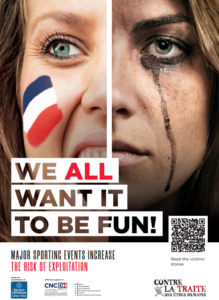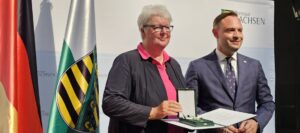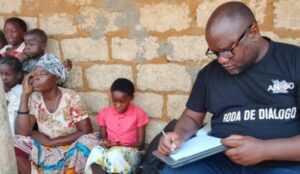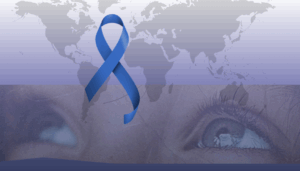By Élodie Comoy, Communications Coordinator, Province of Europe-BFMN
As the 2024 Olympic and Paralympic Games get underway, the French association “Ensemble contre la traite des êtres humains” (“Together against human trafficking”) has launched a new awareness-raising campaign. The Campaign aims to draw attention to the increased risk of exploitation on the sidelines of major sporting events.
The association ‘Together against human trafficking’ is a network created to more effectively fight against all forms of this denial of human rights. Created by Secours Catholique Caritas France in 2007, its members include twenty-eight French organizations, one of which is the OLCGS Province of Europe-BFMN. These organizations are committed – directly or indirectly – to defending victims of any form of exploitation and trafficking in France or in their countries of origin, transit, or destination.
Where is France in terms of progress? A third national plan to combat exploitation and human trafficking for the period 2024-2027 has just been published. The association was involved in the reflection process, but not in its drafting. According to Geneviève Colas, the association’s president, the positive outcome of this plan is the distinction made between the various forms of trafficking. For example, in the first plan, it seemed that trafficking only involved sexual exploitation, which is the main form in France, but it is not the only one.
Exploitation for economic gain and through forced labor is also discussed in the new plan, even if the issue of domestic slavery seems to be overlooked. Being forced to commit crimes or beg are mentioned, but it is regrettable that these two forms of exploitation are in the same part of the plan… probably because they are less well known.
 The theme for the association’s new campaign is “We all want it to be fun.” Its objective is to make people aware of all forms of exploitation, help identify victims, and propose courses of action to offer support.
The theme for the association’s new campaign is “We all want it to be fun.” Its objective is to make people aware of all forms of exploitation, help identify victims, and propose courses of action to offer support.
Through nine life stories, the campaign illustrates all the forms of exploitation and human trafficking that women, men, and children of all ages and origins can face: sexual exploitation, labor exploitation (personal care services, construction, catering, transport, etc.), domestic slavery, forced criminality, forced to beg, etc.
The association has alerted the public to the need for increased awareness and the implementation of measures to support potential victims of prostitution.
Geneviève Colas asked for information stands with ‘translations’ for people who do not speak French, as well as trained staff. “The big challenge for the Olympics is to face the fact that this exists and to find a way to be able to better support victims,” she said on television.
With associations having also warned about the increase in cases of the exploitation and prostitution of young people via social networks, police announced reinforced vigilance online during the Games*.
*Read here about how the Good Shepherd Center in Singapore delivered awareness-raising training to young people on the safe use of social networks and digital technologies.







